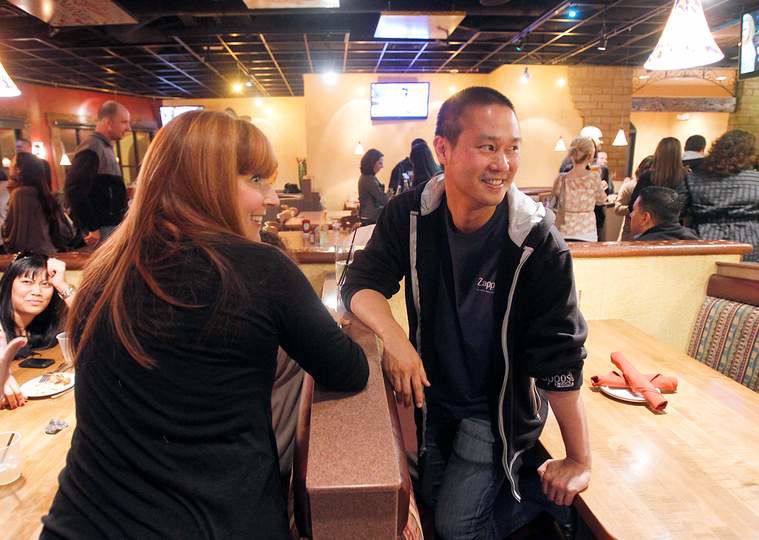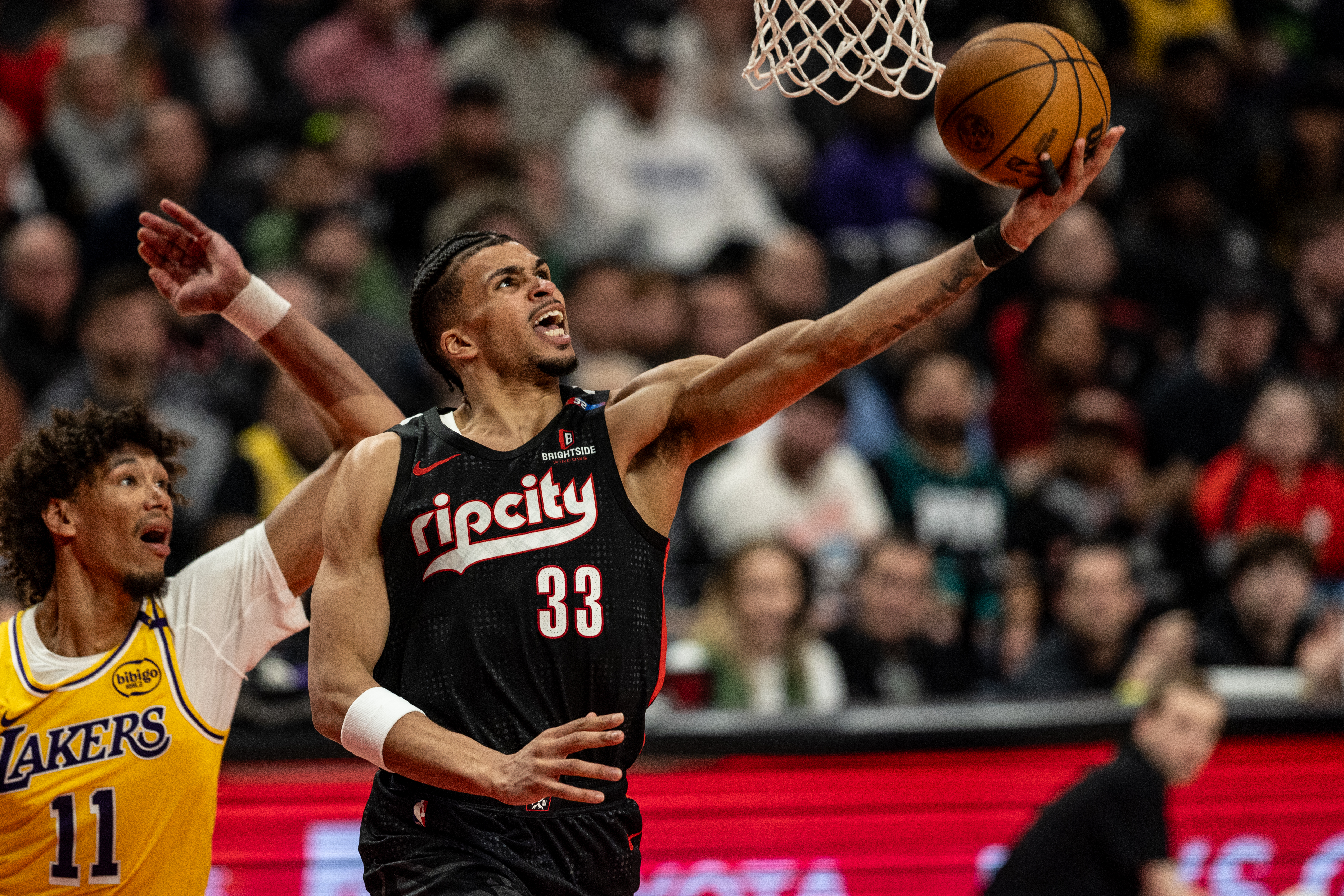Why is the head of Zappos smiling?
Published 5:00 am Sunday, April 24, 2011

- Tony Hsieh, the chief executive of Zappos.com, socializes with employees at a bar near Zappos headquarters in Henderson, Nev., in January. “He draws energy from people,” says Alfred Lin, a Harvard classmate of Hsieh’s.
HENDERSON, Nev. — Tony Hsieh, chief executive of Zappos .com, the online shoe and clothing retailer, was sitting in an office he rarely uses at the company’s headquarters here, recollecting the high and low points of his childhood. He had just finished putting a roomful of corporate managers through the same exercise, and now it was Hsieh’s turn.
After pondering for a long moment, Hsieh, who sold Zappos to Amazon.com for more than $1 billion in 2009 and whose book, “Delivering Happiness: A Path to Profits, Passion and Purpose,” spent 27 weeks on the New York Times best-seller list last year, identified the high as a Halloween night in middle school, when a group of trick-or-treating friends ended up at his family’s home.
The low point: missing the last dance of eighth grade because he was taking an SAT test the following morning. “I remember being pretty disappointed,” he recalled.
Hsieh, 37, seems in some ways to have spent his career trying to re-create that Halloween night while salving the wounds left by that missed dance. So there he was on a balmy midwinter night, hosting a party at his suburban Las Vegas home for a group of managers and would-be entrepreneurs who had paid $4,000 each to be marinated in Zappos’ wacky, free-to-be-me ethos for the company’s two-day Culture Boot Camp. Hsieh circulated discreetly in a Zappos hoodie sweatshirt, jeans and black Donald J. Pliner slip-ons, wandering among the living room, with its enormous flat-panel television and custom-built scooter rack, a room done up like a hookah bar, and the back patio, where a shimmering pool was surrounded by Miami Beach-style beds.
The Zappos ‘tribe’
The festivities were in keeping with Hsieh’s ongoing campaign to build his community, or, as he frequently writes in his book, his “tribe.” In the Zappos offices, costume parades are commonplace, as employees wind among cubicles plastered with posters and mementos that give the headquarters a teenage aesthetic. Zappos recruits talk breathlessly of the Fourth of July barbecues and New Year’s Eve parties that Hsieh hosts every year at his home. And although he lives alone, assorted friends, business associates and people he’s met on book tours keep his five guest rooms in heavy use.
Unlike fellow Harvardian Mark Zuckerberg, Hsieh (pronounced shay) is not yet a household name, even among the legions of customers who delight in Zappos’ large selection, free shipping and free returns. There is not yet a movie cribbing his rise to dot-com success. But he has become a celebrity in entrepreneurial circles, having sold his first company, LinkExchange, to Microsoft for $265 million when he was just 24, and for turning Zappos into the largest seller of shoes online.
His profile is also growing: He appeared as a judge on “Celebrity Apprentice” two years ago; he has 1.8 million followers on Twitter (One recent post: “Swam in Silverton mermaid aquarium on my birthday! Wore costume b/c they don’t allow birthday suits.”); and his book appeals to a broad swath of teachers, students, parents and even dating gurus who see in it a broader message of self-improvement. The Culture Boot Camp drew a mix of entrepreneurs and managers eager to meet Hsieh, including the head of retail operations for the Marine Corps and a church youth-group consultant.
Now, Hsieh is hoping to spread his vision to downtown Las Vegas, where Zappos recently announced it would be moving its headquarters to the former City Hall. In an unglitzy area of the city rarely seen by casino-bound tourists, Hsieh envisions, among other things, a zipline connecting bars, clubs and the Zappos offices.
Reading “Delivering Happiness,” one could get the impression of Hsieh as a gung-ho Michael Scott type (if he actually motivated his employees on “The Office”). He misquotes from his favorite movie, “Pretty Woman” (“I was living the fairy tale,” his version of “I want the fairy tale”), describes elaborate office pranks and urges companies to “make WOW a verb.”
Yet in person, Hsieh, who has close-cropped black hair, speaks quietly and with little inflection. In a group, he calls little attention to himself and often lingers on the sidelines. “He draws energy from people,” said Alfred Lin, a Harvard classmate of Hsieh’s who was Zappos’ chief financial officer until last year. “But he’s not an overtly ‘Hey, I’m the center of the party kind of guy.’ ”
At times, Hsieh comes across as an alien who has studied human beings in order to live among them. That can intimidate those who are not accustomed to his watchful style. “I have been in job interviews with him where you are expecting more, and it can be awkward silences,” said Ned Farra, who manages relationships with other websites for Zappos. “He is not afraid of it. It is almost like he is testing you.”
Hsieh said that he deliberately surrounds himself with people who are more outgoing than he is, in part to draw himself out. On the night of the party at his home, Hsieh introduced Antonia Dodge, a “personality assessment consultant” to Zappos, to explain why he often appeared somewhat “staid.”
Hsieh has “a form of social phobia,” Dodge said. “But he gallantly walks over it by not letting it stop him and always pursues social situations. And second, he lubricates with tons of vodka.”
Indeed, Hsieh clutched a metal shaker full of red wine because he and two colleagues were following Tim Ferriss’ “4-Hour Body” diet, which prohibited hard alcohol but allowed two glasses of wine a day. Hsieh, who said he prefers Grey Goose and soda, noted that the diet didn’t stipulate the size of those glasses. “I have been trying to find every loophole possible,” he said.
Business savvy
Jason Levesque, a Harvard friend who worked at LinkExchange, recalled Hsieh’s self-effacement. When inviting friends to play a video game, “he was obviously the best at the game, but he would sort of hide that in order to get everyone to play,” Levesque said. Like Zuckerberg’s, Hsieh’s success has been built in part on his ability to anatomize the way people crave connections with others, and turn those insights into a business plan. He has never pretended to be interested in shoes and began his involvement with Zappos as an investor. But by promoting the perks of a highly social company where workers get free sodas and popcorn, decorate their cubicles, are invited to share their ideas and can climb the career ladder from inside, Zappos is able to pay below-market salaries for its more senior workers. “We want them to work for us for reasons other than money,” Hsieh said with a shrug.
Although his admirers credit Hsieh with having created a unique (and unified) culture at Zappos, others point out that what he is doing is actually simple, and perhaps not so original.
Nick Swinmurn, the Zappos founder, who left the company in 2006 because he grew weary of attending “meetings about meetings,” said Zappos’ wackiness was as much about publicity as strategy. “One thing Tony is good at is he definitely catches on with what might seem interesting as a story,” Swinmurn said. “At the beginning you had everyone young and single, and we had beds for employees to sleep in and a ton of Red Bull, but that’s what every dot-com did.”
Hsieh makes a point of appearing at key company events to mingle. At a quarterly awards party for employees who exceeded sales targets or were being promoted, he sipped a vodka and soda (it was his day off from his diet) and watched intently as various teams showed lighthearted homemade videos, including one where staff members satirized the television show “Glee.”
In a room that felt a bit like an evangelical youth conference, Hsieh seemed eager to demonstrate that he, too, was a fun-loving guy. He disappeared to the men’s room and returned with an iPhone photo of a miniature football goal that was placed in each of the urinals — an innovation that Hsieh suggested to the managers of Nacho Daddy, where the party was held and in which he is a silent partner. And he gamely joined several employees at the karaoke microphone, barreling through the lyrics of “Signed, Sealed, Delivered, I’m Yours” and “Take on Me” in an off-key voice.
Then he quietly slipped out from the party. Employees talked affectionately about him after he had gone. “Sometimes I look at him, and I say, ‘He is such a dork,’ ” said Lauren Glassman, a buyer in the action sports clothing division, as she downed a goblet of beer. “But at the end of the day, we are all dorks.”






